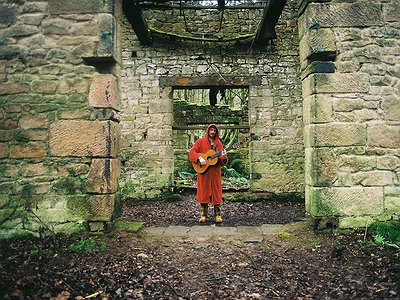Part 2
Could you take us through a day in your life, from a possible morning routine through to your work? Do you have a fixed schedule? How do music and other aspects of your life feed back into each other - do you separate them or instead try to make them blend seamlessly?
I don’t want to pretend that every day is like what I am about to describe, because it’s hard to keep a consistent routine, especially when a tour or R&D comes into play. However, a good day consists of: wake up, do a little bit of yoga to wake up the mind and body, then back to bed, laptop in hand or, I’ll go into the studio and write what needs to be written. This time is reserved for serious things, such as applications or compositions … or writing this. Then I will eat or go to the gym, and eat again, which will take me up to 12/1. Then I have nothing else to do but make music, where my mind is completely clear, I can easily work for 6 to 12 hours.
As for separating or integrating, well, days like this happen quite rarely. However, I find that I mull ideas over in the back of my head, from lyrics to songs to ideas. These can stay in the subconscious for any amount of time, sometimes years. Then when a good day comes, I have a massive splurge and all the ideas come together at once. I have come to rely on this happening so much in the last few years, that I can go for months before going into the studio.
Could you describe your creative process on the basis of a piece or album that's particularly dear to you, please? Where did the ideas come from, how were they transformed in your mind, what did you start with and how do you refine these beginnings into the finished work of art?
It’s difficult to choose as each has its own unique individual creative process. I think that the most interesting would be the new album for Bethlehem Casuals. The idea started when we were recording some improvised jams for the interludes in the first EP Croissant Macabre. They were recorded in a beautiful space at the Royal Northern College or Music and came out so raw and honest that I decided to expand on that idea. I also wanted to expand on the storytelling aspect of that EP. I thought it would be cool to get in with a story line and improvise the whole album in a day, I put the idea to bed and cracked on with The Casuals’ second album, Feels on Wheels. Sometime between then and picking back up with the story idea. Instead it became this prog/folk children’s book peppered with light motif epic build-ups and a whole lot of stuff that could never be reproduced by us all together playing live in one room.
There are many descriptions of the ideal state of mind for being creative. What is it like for you? What supports this ideal state of mind and what are distractions? Are there strategies to enter into this state more easily?
Instagram is the devil when it comes to being distracted. I have a terrible habit of turning to Instagram when I am stressed or feeling down, it’s just escapism in the worst possible form. I also listen to podcasts too as a way of filling the gaps in a day, When it is time to start work it can be hard to break off from whatever podcast is filling the void and instead jump into the scary, sometimes empty space of the creative process. Setting aside time where the phone is in the other room is a great way to start, as it often leads to spending a much longer time away from the phone. As for getting into the right mind set, yoga is the perfect warm up, as it gets the blood flowing and the mind ready to work.
How is playing live and writing music in the studio connected? What do you achieve and draw from each experience personally? How do you see the relationship between improvisation and composition in this regard?
For the forthcoming album After a Long Time and my own compositions, I would not usually perform them in the beta stage, and therefore the recording is somewhat rawer and less adherent to audience input. With my newer solo stuff that I perform with a band and with Bethlehem Casuals, I like to get ideas out to the stage as soon as possible.
How do you see the relationship between the 'sound' aspects of music and the 'composition' aspects? How do you work with sound and timbre to meet certain production ideas and in which way can certain sounds already take on compositional qualities?
It is always difficult to marry compositional ideas and timbre perfectly. I get carried away in the compositional ideas, mostly when I am walking around town or trying to sleep. Ideas will be spinning around in my head and I will try to turn these bits of grit into a musical pearl. For a composition this can be a problem, as when you are given only a small amount of time to workshop the piece with the ensemble, you can realise that you need to do some quality control. When working on pre-recorded music this can happen in the over dubs or the production.
Our sense of hearing shares intriguing connections to other senses. From your experience, what are some of the most inspiring overlaps between different senses - and what do they tell us about the way our senses work? What happens to sound at its outermost borders?
I don’t think I have Synaesthesia, however, I associate music with colour. I have noticed that this is heavily influenced by the artists’ image. So, going on this strong colour association there are colours I like in music, and colours I don’t. It would be hard to explain what colour I do and don’t like because it’s the variety and depth within the colour that I seem to like.
Art can be a purpose in its own right, but it can also directly feed back into everyday life, take on a social and political role and lead to more engagement. Can you describe your approach to art and being an artist?
I’m not a particularly dogmatic person when it comes to my politics. Therefore, politics has rarely made its way into my music, in fact in some cases I have chosen to write overstated fairy tales in order to remove myself from doing this. As the world, and the art created within it, becomes more politically active, which I feel it is, then I feel more pressure to weigh in on the social/political discussion. Therefore, it becomes difficult for me to maintain honest expression if I am trying to also express myself in a way that feels unnatural.
It is remarkable, in a way, that we have arrived in the 21st century with the basic concept of music still intact. Do you have a vision of music, an idea of what music could be beyond its current form?
The music industry is obviously always shifting and often looks positive and often doesn’t. But for music itself, so much is changing all the time that it is hard to even form a clear picture of what is there. The difference between now and when I was growing up, I feel, is that there is a lack of subculture. Artists blend so many genres together and are so unafraid to be known for listening to everything that alternative no longer seems to exists. These days, I often find that the unknown indie music I like is playing in my favourite theatre or at the café or book shop, and there are pop artists today that fuse genre more successfully than fusion artists in the 70’s and 80’s did.






